Community Education
PSD stands for Peninsula School District and its Purple Star distinction
“I am a military child. That means moving every few years and constantly fighting change,” said Brendan Masini Jr., as he spoke in Olympia in early 2023 to support a bill creating a Purple Star Award for military-friendly school districts.
Education Sponsor
Education stories are made possible in part by Tacoma Community College, a proud sponsor of Gig Harbor Now.
“Whether those changes were new schools, new people, new surroundings, or watching my dad leave on deployments and missing important parts of my life, change rocked my world,” Masini, then a Gig Harbor High School senior, told the Senate Early Learning & K-12 Education committee. “Change shaped me, and change throughout my childhood left me vulnerable even as I sought stability.”
Four moves over the course of his K-12 school years. Four deployments during which the Army stationed his dad, Col. Brendan Masini, MD, in the Middle East.
“And I’m one of the lucky ones,” Masini said. “While many had it worse, it was still difficult to find support in the lonely times. After all, what do you say to the little boy crying on his fifth birthday because his dad was in Afghanistan or the teenager who played a bad game of baseball while his dad was in Kuwait?”
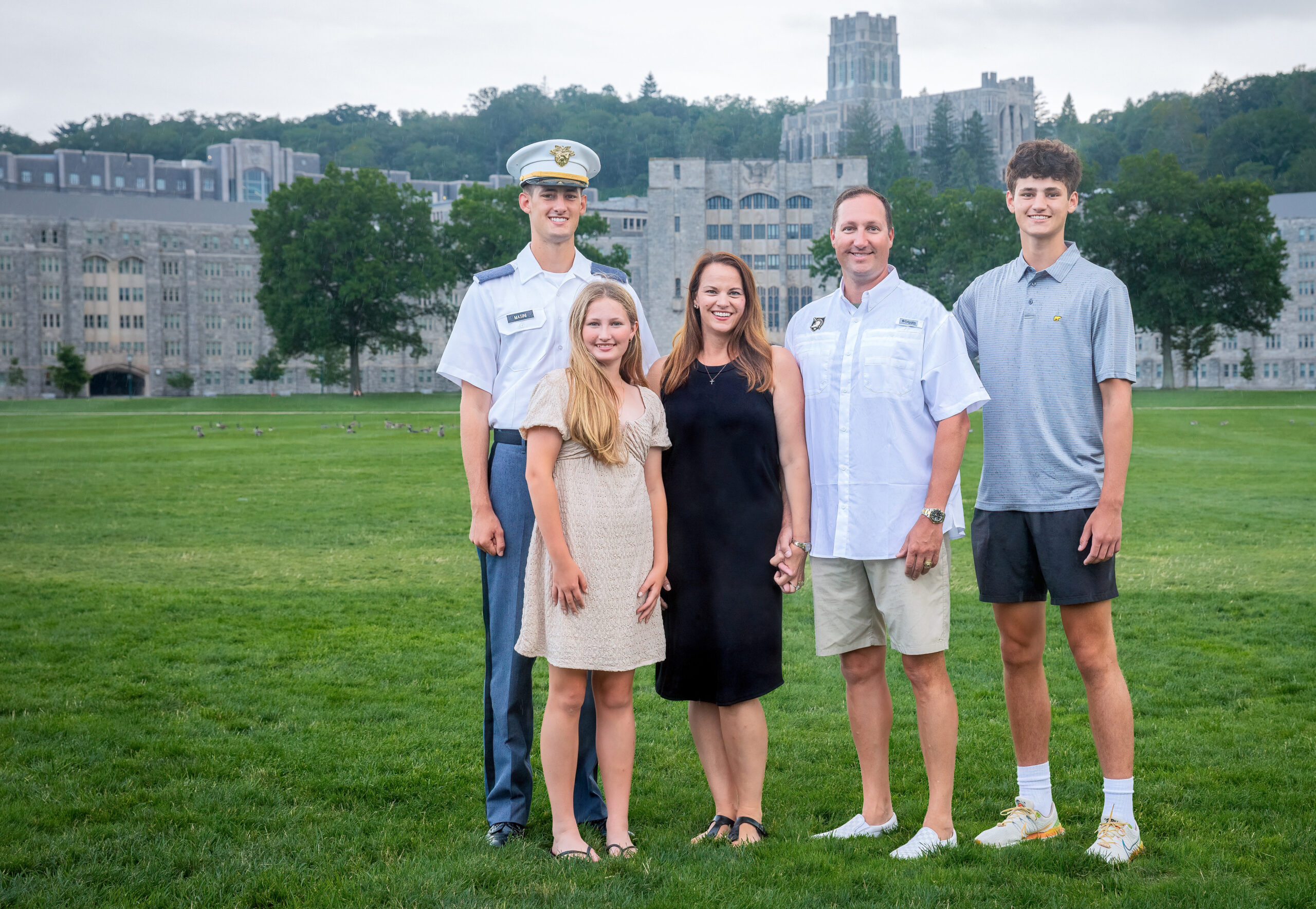
Brendan Masini Jr., Gig Harbor High School Class of 2023 (left), testified in January 2023 in support of the Purple Star bill recognizing military-friendly school districts. Masini, now a plebe (first year) at West Point, with his family: Caroline Masini, a seventh-grade student at Kopachuck Middle School; mom Carrie Masini; dad Army Col. Brendan Masini, MD, stationed at Joint Base Lewis-McChord; and brother Michael Masini, a sophomore at Gig Harbor High School. Courtesy Masini family
PSD earns Purple Star Award
Masini had to “buck up” and “put on a good face.” Yet typical teenage issues were “compounded by always being the new kid.” What made a difference, he said, were teachers, friends and others who reached out in gestures of support.
“I began to find that when people were aware of what I was experiencing, it made my life much easier,” said Masini, now in his first year at West Point.
The Legislature passed and Gov. Jay Inslee signed the bill in January 2023. It aimed to spread awareness of the military child experience and enhance support for military families. Peninsula School District is among the first districts in Washington to earn the Purple Star Award. Central Kitsap and Bremerton school districts also earned Purple Star designation.
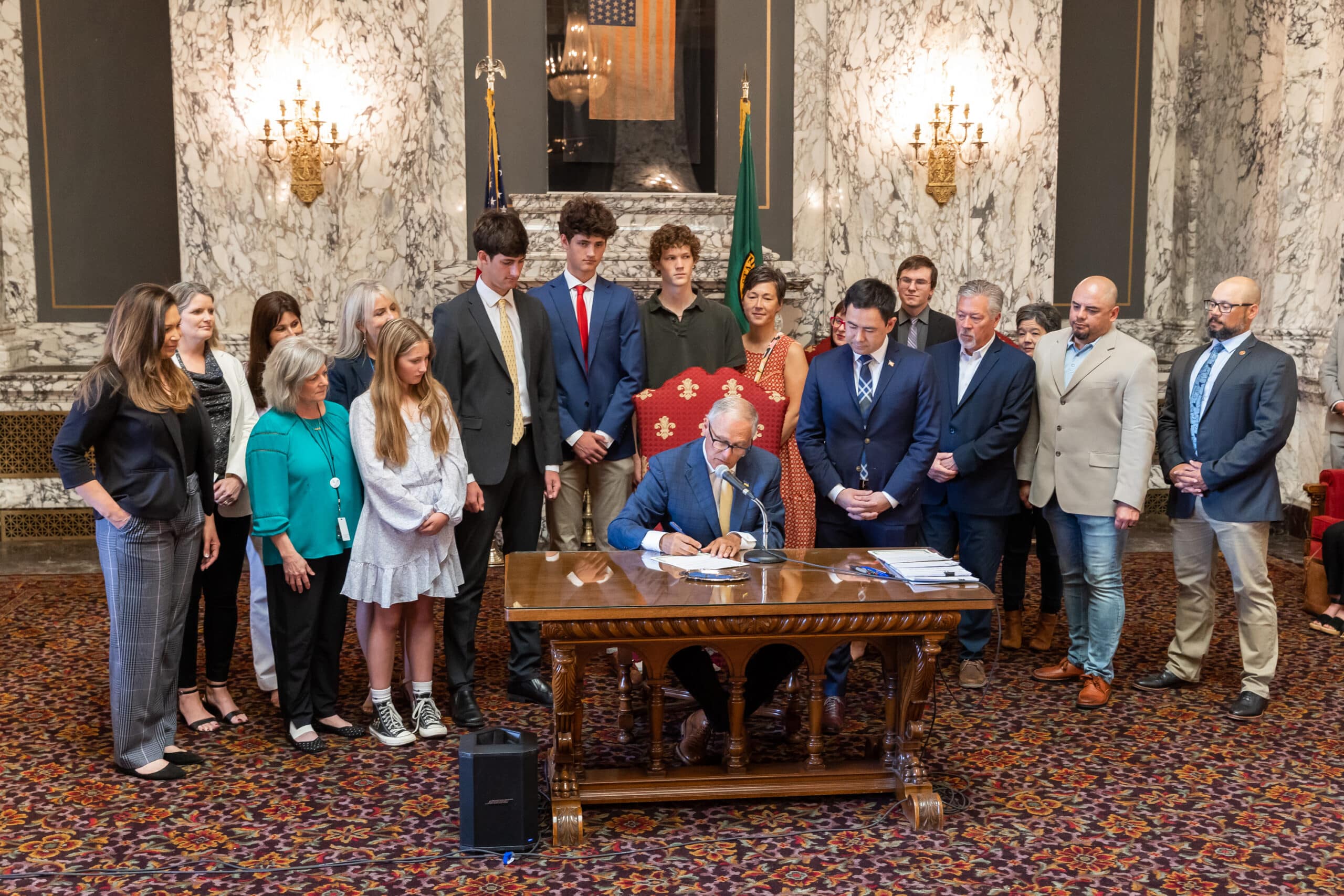
Gov. Jay Inslee signs a bill creating the Purple Star designation for military-friendly school districts on May 15, 2023. Members of the Masini family and Peninsula School District officials, among others, surround Inslee. Photo courtesy Washington state Legislature
“I am incredibly proud of the strides our district has taken to support our military-connected students, both local and across the state of Washington,” said Natalie Wimberley, Peninsula’s school board president.
Wimberley and Superintendent Krestin Bahr both grew up as “military brats.” They lobbied for the bill and were instrumental in moving it forward.
Serving families with pride
Peninsula School District has 499 military-connected students from 322 families, including active-duty service members, those in the reserves and veterans.
With total enrollment at just more than 9,000, Peninsula’s percentage of military families is less than districts adjacent to military bases like Central Kitsap (with around 14 percent) or Clover Park (with nearly 35 percent). Yet the Gig Harbor area, situated between Joint Base Lewis-McChord and Naval Base Kitsap, has become a draw for military families for its schools and quality of life.
School districts nationwide must comply with the federal Interstate Compact on Educational Opportunity for Military Children, but not all staff in all districts are aware of its requirements, said Wimberley, whose husband Heath is a retired Air Force pilot.
The compact ensures students can move from district to district and receive comparable services. For example, if they qualified for gifted education or made the varsity cheer squad in their old school, they are automatically ensured a spot in their new school.
“Being a Purple Star district means we are taking all the extra steps to ensure that we are familiar with all the provisions in the compact,” Wimberley said.
Qualification criteria for the award include having a designated district liaison and dedicated web page for military families; training for staff on military families’ needs and challenges; board resolutions, and special recognition through events and social media.
Points of contact
Peninsula School District was on its way to meeting Purple Star standards even before receiving the award in early April, Month of the Military Child.
The district already had a designated point of contact for military families. Next year, with a shift in administrative roles, that person will be the executive secretary to the new deputy chief of schools. The job entails connecting staff in all schools with incoming families.
Master Chief Michael C. Gosart and his wife Kimberley Gosart moved to Gig Harbor with their sons Devin, 11, and Lukasz, 9, in 2022. Gosart is Command Senior Enlisted Leader of Puget Sound Naval Shipyard & Intermediate Maintenance Facility in Bremerton. Swift Water is the third elementary school Devin has attended.
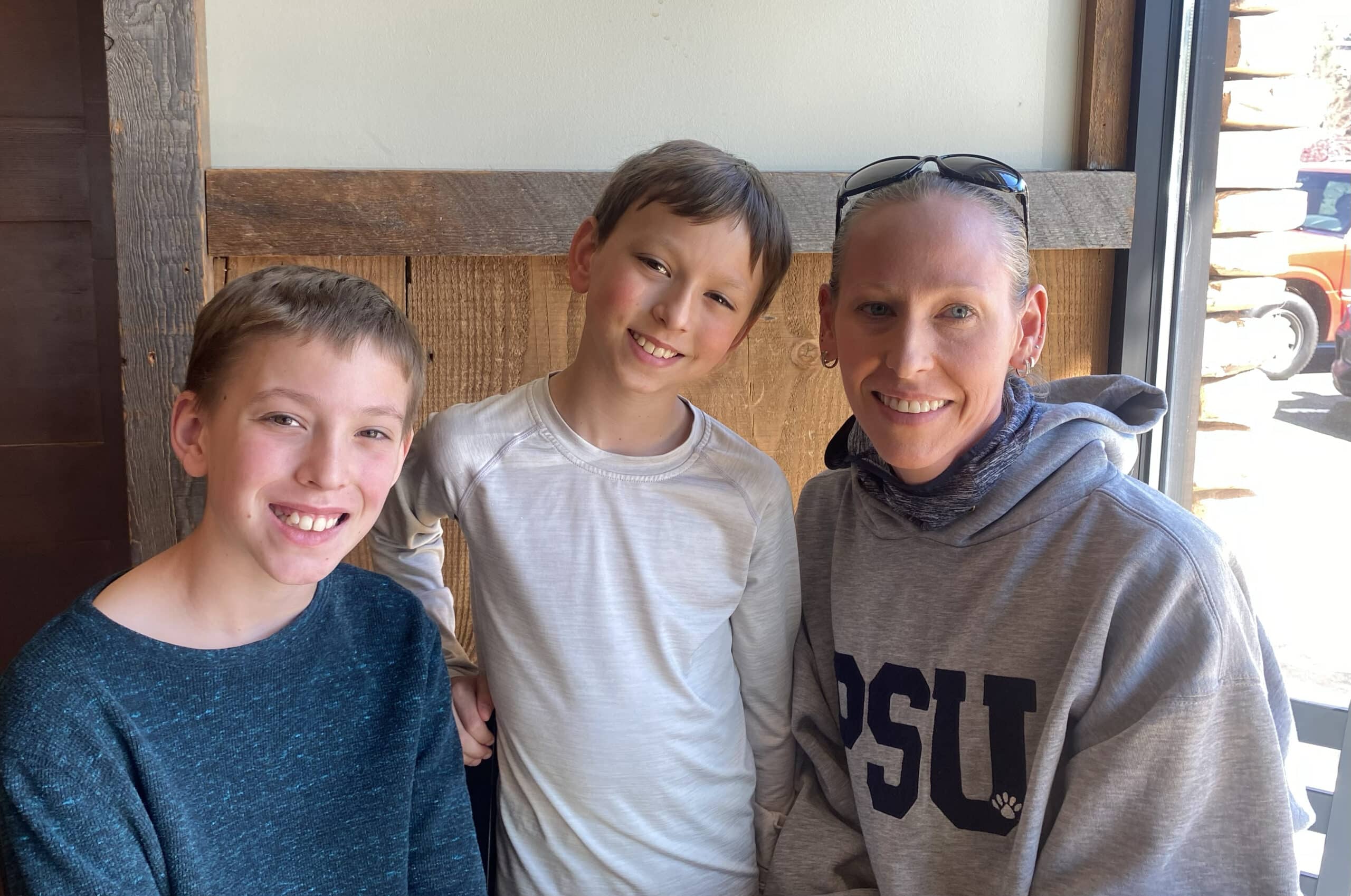
Devin, left, Lukasz and mom Kimberley Gosart talked about life as a military family in Peninsula School District. Dad, Master Chief Michael C. Gosart, is Command Senior Enlisted Leader of Puget Sound Naval Shipyard & Intermediate Maintenance Facility. Photo by Christina T Henry
Kimberley wanted to register the boys for school before their move from San Diego. As she juggled a long to-do list, Swift Water office staffer Brenda Abel helped smooth the way to establishing their residency with a utility bill.
“’Don’t worry about it,’ she said. … It was great,” said Kimberley. “It was one less thing to be stressed about because she picked up the phone and called.”
Passing the bill
Bahr made military families one of her priorities when she became superintendent of Peninsula schools in 2021. Her father is a retired Air Force lieutenant colonel who did two tours of duty in Vietnam and who worked for the USAF Office of Special Investigations. He later worked for USAID, which partners with the Department of Defense on global stabilization. Bahr moved at least 12 times between kindergarten and high school graduation.
“That’s why I was very interested in the Purple Star, because it solidifies the fact that we are opening the door not just to military families, but also families where children have to pick up and move throughout their educational system.”
Wimberley’s father also was in the Air Force, a pilot for 20 years. When she and her pilot husband Heath lived in New Mexico, Wimberley was the military liaison to the school district her three children attended. She has brought that experience to her work on the Peninsula school board to which she was elected in 2019.
Wimberley and Bahr worked with other state education leaders to lobby for the Purple Star bill. Versions of it were already law in other states. With others advocates, they suggested changes to the bill that removed barriers like concerns over cost (which is minimal). After two previous failures, the bill received strong bipartisan support and became law in July 2023.
Purple Star provisions
The Purple Star designation recognizes that school districts need to offer an entry plan for military students. Transfer of credits and meeting graduation requirements, which differ from state to state, are two critical hurdles facing incoming students. Another challenge is connecting new students to activities and peer groups.
“Our middle and high schools have worked to ease these transitions by engaging students in leadership classes to welcome new students and familiarize them with the school culture,” said CFO Ashley Murphy, who also has military connections. “PSD counselors meticulously review incoming transcripts and conduct graduation credit checks.”
Purple Star districts recognize military students as an asset to their schools. Frequent moves mean these students typically develop flexibility, advanced social skills and a commitment to community service, Murphy said. “The presence of military-connected students can offer opportunities for other students to learn about resilience, adaptability and different cultures, which are essential skills in a globalized world.”
Finding resilience amid change
Transitioning to a new duty station brings a raft of logistical hurdles for military families: finding a new home, packing, unpacking, settling into a new community. For students, there’s being the new kid at school … again.
The Masinis most recently moved in 2019 from Colorado Springs to Washington state. Brendan Sr. is stationed at JBLM.
“It’s always a little challenging having to go someplace new and not knowing anybody,” said Caroline Masini, in seventh grade at Kopachuck Middle School.
Caroline and brother Michael, a sophomore at Gig Harbor High, say joining sports teams and, in Michael’s case, student government, helps them adjust and make new friends.
“I would definitely say it makes me more resilient,” said Caroline of military life. “But I also don’t let too much of what happens in the military affect me.”

The Masini family, Army Col. Brendan Masini, MD, stationed at Joint Base Lewis-McChord; Caroline Masini, a seventh-grade student at Kopachuck Middle School; Michael Masini, a sophomore at Gig Harbor High School; and mom Carrie Masini. Brendan Masini Jr. is a plebe (first year) at West Point. Photo by Christina T Henry
Living in different parts of the country (and sometimes the world) gives military children a breadth of experience.
“They’re going to fit in wherever they go,” Brendan Sr. said. “They’re a little bit like chameleons that way, and they have a lot of interesting experiences from the places they’ve been or just activities they’ve been exposed to that let them identify with a wide variety of people.”
Coping with deployments
Military parents are used to advocating for their own families, said mom Carrie Masini. But Peninsula School District’s commitment to go the extra mile means a lot.
“The Purple Star program is so important because the district becomes more empowered to be proactive on seeking out those families and identifying those who might benefit from services,” she said.
Michael Gosart was away from his family for 11 months the last time he had sea duty in 2019. Kim Gosart described coping with deployment like this: “Usually the first two weeks after they leave, there’s a big adjustment period. You’re getting used to him being gone. They might be a little bit more sad. Then you kind of get into your groove.”
Halfway through the deployment feels like you’re on the downhill, Kim said. “I think they’ve been doing this for so many years, they’ve just gotten used to it. They’re very resilient. I think part of it is just how I train them to be.”
In the weeks before dad returns home, the kids typically grow more excited and can seem distracted or even nervous, she said. Homecoming is always a big thrill. Then comes the adjustment of having him home again.
Teaming up, staying strong
Students with a parent deployed to another state or overseas face extra challenges.
“I’m pretty sad at times, knowing he’s not there when we come home or coming to sporting events or anything like that, but we pass the time,” Michael Masini said.
“I think there was one time he was deployed and it was over winter and he was gone for Christmas and my birthday, which is kind of sad,” Caroline said.
The ever-improving technology of face-to-face chatting has been a Godsend, the Masinis say. Now, they can even live-stream sports events for their dad.
Deployments test a family’s teamwork and sibling bonds.
“I think we all support each other,” Michael said. “Whenever you need help with something, homework, or just need to chill out for a day, we know how to help each other in those situations.”
School staff can also be a critical pillar of support, Carrie said. “It was made very clear from the (Peninsula) district that the kids had support in the schools. That if they were having issues, that it was something they could talk to people about,” she said.
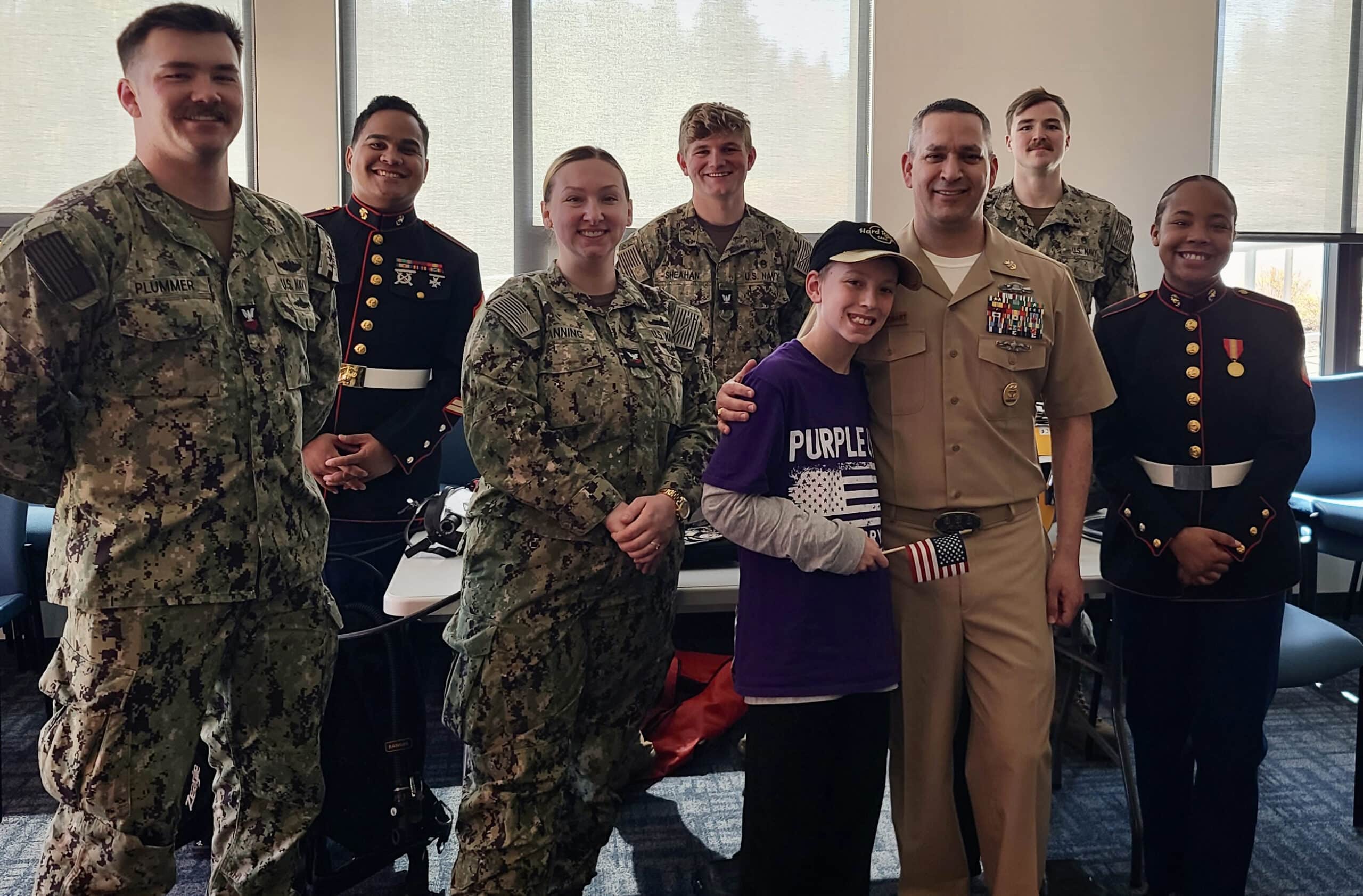
Devin Gosart (holding flag), 11, and his dad Navy Master Chief Michael C. Gosart joined other military service members at Purple Up Day on April 12 at Swift Water Elementary School.
Photo courtesy Kimberley Gosart
Purple Up Day
On April 12, Swift Water Elementary celebrated military families with Purple Up Day, “dedicated to recognizing the resilience and sacrifices of our military children.”
Students wore purple, signifying all colors of the military branches, to show support for their military-connected peers.
Kim Gosart, with others on in the school’s Volunteer Parent Organization, helped organize the event. Kim, with help from her husband, arranged for military personnel to visit the school and share about their jobs.
Devin and Lukasz were surprised and excited to see their dad at school. Lukasz said one of his favorite parts of the day was the special pizza party for military students.
“The kids felt extra special that day,” Kim said.
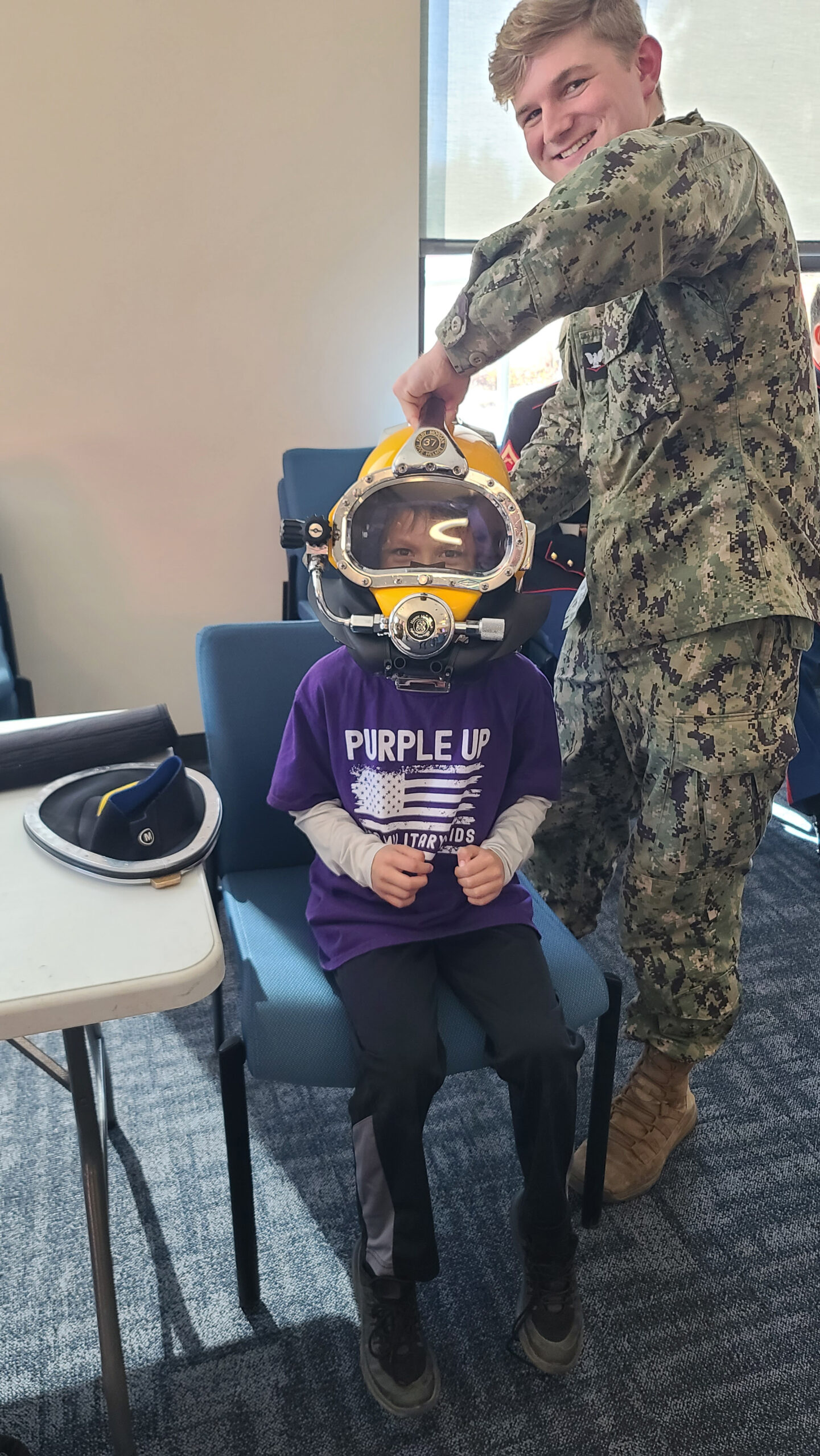
Lukasz Gosart, 9, tries on a dive helmet at Purple Up Day on April 12 at Swift Water Elementary School. Purple Up Day honors military-connected students. Photo courtesy Kimberley Gosart

